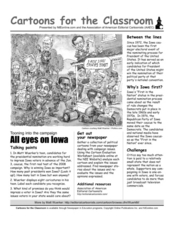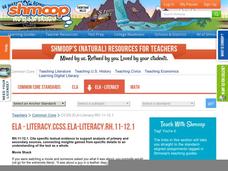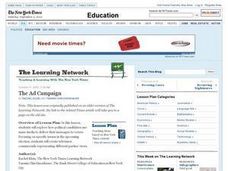Curated OER
What is a Noun? & When To Capitalize Nouns
Nouns are the focus of this language arts PowerPoint. Pupils will see that there are five categories of nouns: person, place, thing, idea, quality. The last two are not usually taught, but they are legitimate categories. When to...
Curated OER
The Fall of Rome and the Beginning of the Middle Ages
A major turning point in world history is the focus of this presentation. Rome has fallen, and with its descent comes the Dark Ages. With pictures, maps, and important information about the Middle Ages, this slideshow would be a great...
Florida State College
Parts of Speech
Although designed for a college-level writing lab, this instructional activity provides excellent practice for all learners in identifying and using the parts of speech.
Curated OER
Treaty of Versailles
Students describe the purposes of the Treaty of Versailles. In groups, they analyze the causes and effects of the treaty and discuss why the Americans were so against it. They note ideas for and against its ratification and they make...
Curated OER
Cartoons for the Classroom: All Eyes on the Iowa Caucus
Explore the primary elections through political cartoons. Three talking points guide deeper thinking as pupils analyze a cartoon, which depicts the 2008 campaigning in Iowa. Analysts identify caricatures, research why winning Iowa is...
Shmoop
ELA - Literacy.CCSS.ELA-Literacy.RH.11-12.1
Understanding, analyzing, citing, linking—the four steps required by CC ELA Literacy Standard RH.11-12.1. Enjoy the humor of the explanations of these steps as you examine the suggestions for Common Core designed activities related to...
Curated OER
Structure of Congress
Students examine the structure of Congress. They identify the roles of the Democratic and Republician parties and their leaders. They role play the role of congressmen and pretend to pass new legislation.
Curated OER
Post Civil War Reconstruction
Students analyze the process of Reconstruction after the Civil War. In this U.S. History instructional activity, students discuss specific details about Reconstruction with the class, then complete a worksheet with multiple...
Curated OER
Understanding Reconstruction in South Carolina
Eighth graders interpret historical evidence presented in primary and secondary resources. In this Reconstruction lesson, 8th graders research the role of Reconstruction in South Carolina by simulating the environment of East Bay Street...
Curated OER
The First Years of the Union (1797-1809)
In this online interactive history worksheet, students respond to 11 short answer and essay questions about the United States between 1797 and 1809. Students may check some of their answers on the interactive worksheet.
Curated OER
The Korean War (1950-1953)
In this online interactive history worksheet, high schoolers respond to 10 short answer questions about the Korean War. Students may check some of their answers on the interactive worksheet.
Curated OER
Reconstruction: A Time of Turbulence
Students utilize knowledge and understandings of the Civil War to look at the reconstructive era that followed. In this reconstructive era lesson, Students gain understanding of the definition of reconstruction by building, taking apart...
Curated OER
Ronald Reagan
In this online interactive history worksheet, students respond to 10 short answer and essay questions about the achievements of Ronald Reagan. Students may check some of their answers on the interactive worksheet.
Curated OER
The Constitution: The Head of State
Learners explore politics by participating in a round-table discussion with classmates. In this monarchy lesson, students identify the different political leaders in Australia and conduct a class discussion about the country. Learners...
Curated OER
Populism and the People’s Party
Students examine the history of the Populist Party as it relates to its reforms and economic plight. In this Populism and the People's Party lesson plan, students explore why farmers experienced financial difficulty at the end of the...
National Endowment for the Humanities
NAACP’s Anti-Lynching Campaign in the 1920s
Students investigate the anti-lynching campaign of the NAACP in the 1920's. In this human rights instructional activity, students prepare for and participate in a simulated debate of the Dyer Anti-Lynching Bill that was presented to...
Curated OER
Cartoons for the Classroom: Drawing the Line on Lies
In this current events worksheet, students analyze a political cartoon about the health care controversy and respond to 3 talking point questions.
Curated OER
Cartoons for the Classroom: Campaigns and Gas Pains
In this current events worksheet, students analyze a political cartoon about gasoline prices and respond to 3 talking point questions.
Curated OER
The Ad Campaign
Learners explore how political candidates use mass media to deliver their messages to voters. Focusing on specific issues in the upcoming election, students create television commercials representing different parties' views.
Curated OER
Two's Company; Is Three a Crowd?
Students explore the history of third-party politics in America. They research the impact of one third-party or independent candidate for president and develop a poster and stump speech representing that candidate's motivation for running.
Curated OER
Political Parties in Campaign 2004
Young scholars examine the 2004 campaigns of John Kerry and George W. Bush. They identify the parties and their stance on important issues. They use the internet to research information and complete a worksheet to end the lesson.
Curated OER
Death and Taxes
Students explore the "death tax" and analyze statistical information about how the government taxes dead people. They research sources to determine the validity of a anti-tax group campaign and John McCain's claims about taxes. ...
Curated OER
Abe Lincoln
In this Abraham Lincoln worksheet, students fill in the blanks with facts about Abe Lincoln. Students complete nine sentences.
Curated OER
Religion and Politics: The Battle Over the Judiciary
Students analyze the relationship between religion an politics. In this Supreme Court lesson, students examine the results of the 2004 presidential election and explore how the results impacted George W. Bush and his Supreme Court...
Other popular searches
- Republicanism in the 1800's
- Classic Republicanism
- Classical Republicanism
- 1920's Republicanism
- Natural Rights Republicanism
- Agrarian Republicanism
- New Modern Republicanism
- Info Over Republicanism
- Agrary Republicanism
- Democracy vs. Republicanism
- Democracy vs Republicanism
- Agra Republicanism























